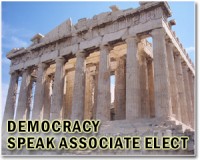| . |  |
. |
Beirut, Lebanon (UPI) Mar 8, 2011 Pro-democracy protesters in Egypt have stormed the Cairo headquarters of the once-feared internal security apparatus and seized secret files. Oman's ruler, Sultan Qaboos bin Said al Said, has replaced one of his security chiefs in a bid to quell street protests. Tunisia's new prime minister has scrapped the hated State Security Department, whose secret police tortured dissidents under ousted President Zine el-Abidine Ben Ali, driven from office Jan. 14. In a move to placate protesters, Algerian President Abdelaziz Bouteflika has announced he will revoke a state of emergency in effect since 1992 and which gave carte blanche to the country's fearsome security services. Across the Arab world, citizens have in recent days turned on the once-powerful intelligence and security services that tormented them for decades under authoritarian rulers who have been brought down or are scrambling to hold on to power in the face of this avalanche of anger. The unprecedented scale of the regional upheaval and the extent to which ordinary citizens of a dozen Arab states have been emboldened to challenge forces once seen as all-powerful is reminiscent of how Eastern Europeans threw of the Soviet yoke in the 1990s. In Jordan, Bahrain, Oman and Yemen, protesters have put kings and presidents on notice that their often harsh rule cannot continue. Saudi Arabia, Kuwait, Morocco and Sudan have felt the winds of change as well. In Libya, Moammar Gadhafi, who has ruled the oil-rich state since a Sept. 1, 1969, coup that overthrew the Senussi monarchy, is fighting for survival in what has become a civil war. The bloodletting in Libya is the most violent manifestation of the pro-democracy surge coursing across the Arab world, and Gadhafi's murderous security services, who in the 1970s systematically hunted down Libya's "stray dogs," dissidents who opposed Gadhafi's rule, are still in place. Only Syria, where the minority Alawite sect has ruled with an iron grip since a 1970 coup, largely through a vast security apparatus, appears to have escaped the political turbulence. But if the current wave of unrest goes on and further erodes the power of authoritarian regimes, the all-pervasive security services in Syria may, too, find themselves cornered. In Egypt, the 50,000-strong Mukhabarat, the generic term across the Arab world for "secret police," remain even though their old boss, President Hosni Mubarak, was forced to step down Feb. 11 after 30 years of ruling with emergency powers. Some 2,500 people stormed the secret police headquarters in the Nasr City district of northern Cairo Saturday, along with five other offices in Alexandria and other cities, an action that was once unthinkable. They seized files to prevent them being destroyed to get rid of evidence of past abuses, including torture on a vast scale. Many of the files, including lists of informers and their codenames, were posted on the Internet. Some people even found files on themselves. But thousands of documents had been burned. The confrontation with the security services, which the protesters demand be dismantled, was a direct assault on one of the most powerful symbols of the regime. It's too early to say with any confidence that the brutal years of repression are over, or are even truly ending. The military is Egypt and Tunisia, the only Arab states so far where presidents have been forced from power, still call the shots. In Egypt, Gen. Omar Suleiman, director of the General Intelligence and Security Service since 1993 and a symbol of repression, has been in charge since Mubarak quit. The generals may be able to oversee a transition to democracy. But the revolutions in these countries have yet to be consolidated and the forces of darkness could yet return to wreak their revenge. In Algeria, the real rivalry for power is between Bouteflika, a former diplomat elected president in April 1999, and Gen. Mohammed "Toufik" Mediene, head of the Military Directorate of Intelligence and Security. Still, says Arab scholar and historian Fawaz Gerges, "regardless of whether the oppressive Arab regimes weather the violent storm, their ruling order is no longer sustainable. "Ordinary Arabs feel empowered, on the verge of a new democratic dawn. They have shed political apathy and joined the political space. The genie is out of the bottle. "In contrast, Arab rulers worry that their long authoritarian reign has come to an end."
Share This Article With Planet Earth
Related Links Democracy in the 21st century at TerraDaily.com
 Cuba cuts jobs, still holds 100 dissidents
Cuba cuts jobs, still holds 100 dissidentsHavana (UPI) Mar 7, 2011 Cuba is cutting back state jobs as part of its plan to embrace market economy in stages but still holds at least 100 political prisoners without trial, independent media reports said. Cuban President Raul Castro announced plans for massive job cuts - half a million for a start - and exhorted Cubans to become self-employed but the tentative step toward market economy of a sort doesn't ... read more |
|
| The content herein, unless otherwise known to be public domain, are Copyright 1995-2010 - SpaceDaily. AFP and UPI Wire Stories are copyright Agence France-Presse and United Press International. ESA Portal Reports are copyright European Space Agency. All NASA sourced material is public domain. Additional copyrights may apply in whole or part to other bona fide parties. Advertising does not imply endorsement,agreement or approval of any opinions, statements or information provided by SpaceDaily on any Web page published or hosted by SpaceDaily. Privacy Statement |